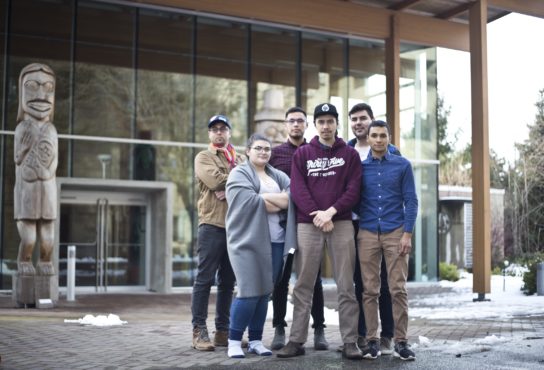The Native Students Union regular column

Photo by Belle White, Photo Editor.
Canadian colonialism is not merely a historic event or relic of the past. It is an ongoing process that continues to negatively impact Indigenous people. Modern colonialism is in many ways no less abusive than historic colonialism, as it advances the same goals of extinguishing Indianness and exploiting native lands.
It’s high time that we dismantle the belief that colonialism is solely a historical crime and that modern Canadians are free from all responsibility. Being born into an unjust social structure doesn’t make upholding an unjust system acceptable. Stolen is stolen.
Mainstream settlers embrace a culture of wealth hoarding that runs opposite to Coast Salish Potlatch Culture. The Potlatch honours generosity, community, territory, and history. Any kind of meaningful reconciliation requires that Indigenous cultures and values be respected and upheld. The Potlatch ban of 1885-1951 and other repressive amendments made to the Indian Act in those 66 years are but few of the many strategies employed for suppressing Indigenous peoples. This was, and continues to be, an attempt at eliminating Indianness, as Indigenous governance and land stewardship inherently complicates Canada’s economic and territorial interests.
On Sencoten and Lekwungen territory there are settlers like Sherry Brydson, a billionaire and Canada’s richest woman, living in a mansion, while many Indigenous locals live in unsafe housing without enough money for stable transportation and healthy food.
—
Reconciliation should mean that people living on Indigenous lands not only “acknowledge” Indigenous peoples, but also make efforts to learn and understand the history of dispossession and oppression and let that knowledge inform their actions.
—
Settlers who have profited immensely from colonialism’s imposition on Indigenous peoples typically do little to give back to the people whose exploitation allowed for their stockpiled riches. These billionaires’ riches could bring prosperity to the local Indigenous population, yet they choose instead to hoard their billions. Excessive hoarding disrupts natural cycles and puts people, places, and things at risk. In pre-colonization times, moderation was respected as necessary and ecosystems thrived.
The powerhouse behind initial colonization was the fur trade — the wholesale exploitation, and often destruction, of fur-bearing animal populations. Animals like beavers were fully extirpated from areas that they had previously inhabited for millennia. While this predominantly enriched settlers and the “back in England” colonial profiteers, it also enriched certain Indigenous people who clawed up the excessive materialism and hierarchical social structure brought with the settlers.
Our modern capitalist Indians have forgotten their ancestors. They neglect their ages-long relationship to the land in favour of sexy capitalism. This leads some settlers to think that since some Indians participate in the system, all Indians should — or eventually will — adopt Canadian/Western values. They’re still holding out for the assimilation of Indigenous people to be successful. They’re still hoping the problematic Indianness will fade from these lands.
Reconciliation should mean that people living on Indigenous lands not only “acknowledge” Indigenous peoples, but also make efforts to learn and understand the history of dispossession and oppression and let that knowledge inform their actions. At the very least, this could mean learning local protocols and not acting contrary to the local Indigenous culture. In a just society, it would mean returning what has been taken, such as culture, land, and a future.







